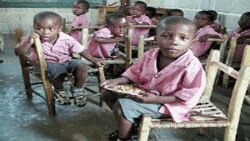People in Ivory Coast are facing a nutritional crisis. Even in the best of times, the World Food Program (WFP) says children do not get enough to eat. And, now they will be getting even less.
WFP Spokeswoman, Emilia Cassela, says the agency has had to make some hard decisions because it has run out of money. She says last month, WFP was forced to cut the size of food rations to half the normal quantity for primary school children.
She warns rations would be cut even more and then stopped altogether at the beginning of April unless new contributions are received.
"For many of the school children receiving school feeding, it is their only real meal of the day," Cassela said. "WFP does expect that if this program is cut, school enrollment will go down in the country. And, Cote d'Ivoire is facing particularly serious situation in terms of malnutrition of children. Chronic malnutrition in many parts of the country is as high as 48 percent."
Casella says other essential programs are being affected by the money shortage. She says supplementary feeding to 10,000 malnourished children will have to be cut. She says $300,000 is needed immediately so these children can continue to receive a nutritious fortified corn-soya blend.
And, she says food assistance to 22,500 children who are affected by HIV/AIDS is in jeopardy.
"We are very concerned. Also, many families really depend on food rations. Certainly the families of the children who are suffering from HIV and AIDS, who are receiving a take-home ration," she adds. "Those 22,000 children, if that ration ends are really-their health is really at risk. And, many of these children are orphans. The take-home ration is to assist the people who are taking care of them as well. So, there are often more than just the child them self who is depending on that food."
The World Food Program notes this sharp reduction in food rations is taking place at a time when the country is on a critical path in the peace process. The agency warns the social cohesion and stability of a country is put at risk when people are hungry.




